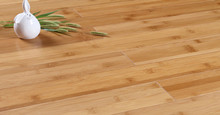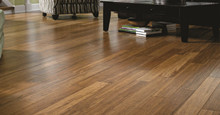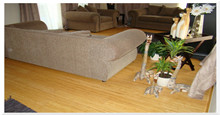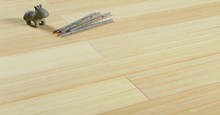Posted on 2020-9-2 14:39:37
What could be more "green" than bamboo? Used in the most varied sectors, from clothing to bamboo flooring, this robust but at the same time flexible plant is characterized by its rapid growth and its robustness which allows it to do without pesticides or chemical fertilizers, in addition to making it so happy the big pandas.
Over the last ten years, there has been a real explosion of products in the field of hardwood floors. With the arrival of products from China, Europe, Scandinavia, South America and Africa, new products come out almost every month and as many disappear from the market. This situation becomes complex for both merchants and consumers.
Some time ago we talked about bamboo parquet, a valid alternative to the traditional wooden one, thanks to its particular characteristics of resistance and hardness, but above all of the renewability of the raw material. Where an oak takes about 120 years to reach maturity, bamboo usually uses 3. The ecological criteria for the use of wood are related to the entire life of the tree and the building constructed: growth, exploitation of the forest, processing of the product, its transport, its use and disposal.
Moreover, from the social point of view, bamboo is a very large source of income in China, where as many as 6 million people are employed in the production and processing of this plant, and one of the myths to dispel is the one according to which, the harvest of the bamboo used for the parquet would eat the giant pandas, already endangered. In reality these wonderful creatures, they feed almost exclusively on the shoots and leaves of only some species, which are found at high altitude and not in the plains where bamboo is collected for industrial processing.
Despite everything, recent studies published by the Environmental Building News, highlighted very worrying problems related to the unsustainable management of the bamboo plant, concerning, in particular, the replacement of virgin forests in China, and in general in Asia, with huge plantations of bamboo so as to become its exclusive monoculture. But not only that, other concerns concerned the use of chemical fertilizers and pesticides to increase their performance, with consequent strong negative impacts on local biodiversity and the soil, dangerously damaged and eroded especially in the steeply sloping air.
However, the good news is that in reality, these practices do not seem to be so widespread after all, as they initially appeared.
In fact, bamboo is not a solid material that is cut into planks like traditional wood, but, especially parquet, it is formed by thin strips that are compressed together with glue, which depending on the supplier, can be free of formaldehyde or less. And the product obtained varies depending on the hardness (which in turn depends on the maturity of the plant), on the quality, on the color (light or carbonized), on the orientation of the filaments or strips (horizontal or vertical) or the manufacturing process (laminated or pressed).
And related to the issue of certification, to affirm the actual sustainability of this plant, it is the discourse related to the management of the chemicals that are used by the suppliers for the processing, in particular, the quality of the glues, resins, binders and the quantity of formaldehyde contained in them. It is, therefore, the choice of the supplier, which has reached this point, which makes the difference between a truly green product and one that is only half-finished. But since no third party certifies this product, how can the veracity of what the suppliers claim to be verified?
An appropriate certification, not only in the final part of processing but also in the initial part of cultivation, is, therefore, the only way to demonstrate the real environmental advantages of this prodigious plant with multiple uses.
Bamboo flooring manufacturers sell it as a cost-effective, environmentally friendly choice. Often, people have small budgets to make their floors, and we would love to get something relatively cheap and sustainable. The call that many consumers have bamboo floors is quite obvious. The manufacturers have done an incredibly good job convincing the public that if you buy bamboo flooring, you make an environmentally responsible choice. It has been abandoning our reliance on hardwoods.



